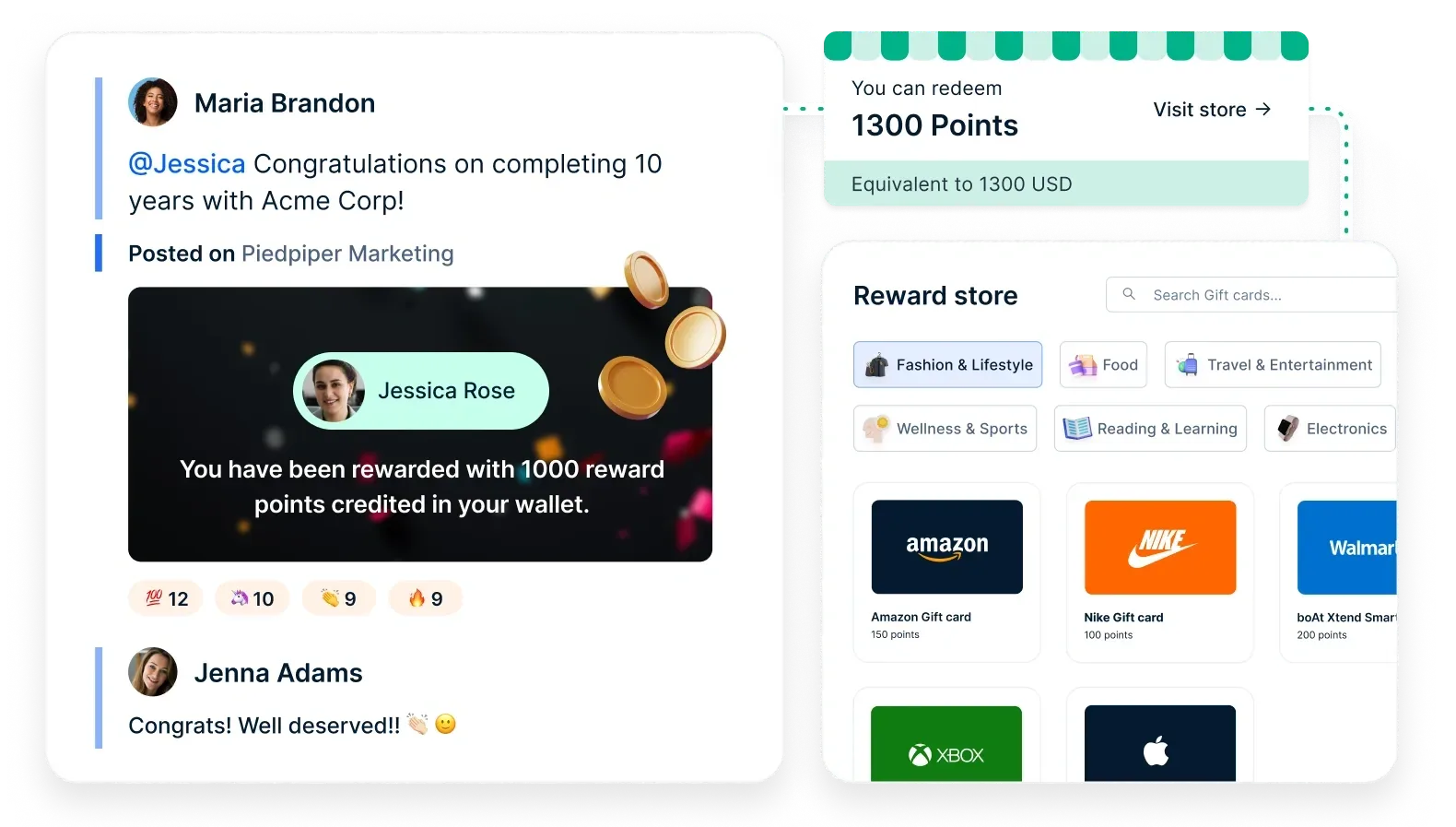How to Engage Millennials in the Workplace: Proven Strategies for Motivating Millennials
Millennials dominate today’s workforce but keeping them engaged requires new strategies. This blog explores how to engage millennials in the workplace and key approaches for motivating millennials to boost retention and performance.
On this page
Millennials are now the dominant force in the workforce, shaping workplace culture and expectations. With their preference for flexibility, remote work, and meaningful roles, traditional engagement strategies no longer suffice. To boost millennial engagement, companies must rethink how they interact with employees and create environments where they feel empowered.
Despite their influence, research shows that most millennials are not actively engaged at work, highlighting the need for new approaches. From recognition programs to career growth opportunities, businesses must adopt strategic methods for motivating millennials and keeping them invested.
This blog explores how to engage millennials in the workplace and drive long-term commitment through modern engagement techniques.
Who are millennials?
Millennials are no longer just young professionals—they are now at the peak of their careers, managing teams, buying homes, and raising families. Born between the mid-1980s and 1996, they have navigated economic crises, global uncertainty, and shifting workplace norms.
Often labeled as entitled job-hoppers, millennials are criticized for seeking feedback, recognition, and flexibility. Yet, these traits reflect a desire for growth, purpose, and engagement, not a lack of commitment. So why should workplaces care about what millennials want?
Because understanding their needs is key to building a motivated, high-performing workforce.
Importance of millennials in the workplace
Millennials aren’t as bad as they’re often made out to be. (I should know—I am one!) The need for feedback and recognition in the workplace isn’t exclusive to millennials; it spans every generation, from Gen Z to Boomers. Likewise, a clear career development path is essential for younger workers—if they don’t see growth opportunities, they will likely leave.
And losing employees is more costly than many realize. Engaging millennials is crucial because they comprise the most significant part of today’s workforce. High turnover can disrupt business operations and drive-up hiring costs. Motivating millennials by providing the right tools, opportunities, and recognition creates a workplace where they want to stay and thrive—benefiting them and your business.
Understanding how to engage millennials in the workplace isn’t just about retention; it’s about building a committed, productive, and driven workforce to succeed.
How to motivate and engage millennials in the workplace
There will be colossal productivity loss when millennial employees get disengaged.
The need of the hour is to engage millennial employees with the work that infuses passion in their minds. The lack of constant engagement is one of the many reasons millennial employees get bored at work.
This is the first thing that must be understood and fixed. Motivating this valuable workforce will make all the difference to your company, but it isn’t always easy to get it right. That’s where this article comes in. Here are a few of the most effective ways to motivate millennial employees.
Young talent is excellent to work with but hard to recruit and retain. If you try following these steps, you’ll be off to a good start when keeping your most valuable staff members.
1. Provide encouragement, guidance, and feedback
Millennial employees are more likely to stay loyal to jobs with development opportunities. Providing ongoing mentorship, guidance, and feedback is the best way to enable it. It’s a win/win situation because providing this feedback helps them get better – and ultimately adds more value to your company.
2. Give them the tools they need
You wouldn’t ask a lumberjack to cut down trees without an axe or a chainsaw, yet we expect employees to do miracles without the required tools. That’s why you shouldn’t be afraid to approve budget requests and allow people to use tools- if these can help them do their jobs to the best of their ability.
3. Promote them internally
As part of their determination to grow, millennials like to receive promotions and even help shape their departments. That’s why it’s a good idea to promote internally where possible and create new job roles and titles with specific employees in mind.
Millennials won’t wait around if they see no opportunities for progression, and you’ll quickly find yourself hemorrhaging talent to your competitors.
4. Improve the work environment
Improving the working environment is a surefire way to increase employee retention and encourage millennial employees to stick around. You can enhance the work environment by increasing pay scales, promoting from within, helping them achieve a work/life balance, providing competitive benefits, encouraging friendly employee relationships, and trusting your employees with responsibility.
5. Offer flexibility
One study found that a good work/life balance is the number one priority for millennials. On top of this, they also appreciate that the stereotypical 9-5 no longer exists. They’re willing to work overtime and weekends, but only if you offer the same flexibility regarding holidays, afternoons off, and more.
6. Give out rewards
Rewarding millennial employees when they’ve done a good job helps to encourage them to be enthusiastic about their work. It can even help create friendly competition between different departments and increase overall job satisfaction. Use tools like enterprise to make the process of reward very smooth.
7. Let them have a side-hustle
Many companies still use generic terms and conditions that prevent employees from working on a side-hustle. However, that’s starting to change as companies like Google, Atlassian, LinkedIn, and Apple give employees freer reign to work on passion projects.
It’s understandable because you don’t want your employees to go freelance and to take your clients with them, but at the same time, it’s essential to support people and to help them grow. After all, as a general rule, the most talented copywriters, designers, and filmmakers are working on novels, art, and movies in their own time.
The least your company can do is offer support where possible to help foster their long-term career.
8. Ask for feedback
Millennials won’t hesitate to tell you if they think something is wrong, so listen to the gossip around the water cooler and ask people what they think. Don’t just save it for annual reviews. Instead, make it an ongoing thing and a part of your company’s culture. Then, once you’ve received feedback, take action.
9. Be transparent
Transparency has been a big buzzword over the last few years, thanks to the rise of social networking, making it almost impossible for companies to lie or bend the truth without someone calling them out. Millennials are the first generation to grow up alongside social networking. They expect the same transparency, authenticity, and trust from the companies they work for as they do from the companies they buy from.
10. Recognize long service
Surveys show that a third of new hires quit their jobs within six months of starting. That’s why you should go out of your way to recognize those employees who stick around for the long haul. This signals to other employees that you value their contributions to the company and can help encourage your millennials to stay with you for longer.
11. Recognize and appreciate
It’s not just millennials - everyone likes to see their work and accomplishments recognized and celebrated in the workplace. However, millennials certainly value rewards and recognition highly.
And if they don’t get it, they’re much more likely to leave your company. In fact, 79% of millennial employees said increasing recognition rewards would make them more loyal to their company.
12. Provide them more learning opportunities
Updating one's skills is not just the order but the need of the day. The reason is changing quite often and throwing multiple challenges to millennial employees. If they don’t update their skills, they will become obsolete and remain unwanted by companies. To prevent them from becoming obsolete, provide them with enough learning opportunities.
There is a paradigm shift in how people learn skills these days. With new-age training platforms such as Udemy and Coursera, anything can be discovered anywhere.
Empuls helps you build a workplace millennials won’t want to leave

Millennials don’t just work for a paycheck—they want purpose, recognition, and benefits that genuinely improve their lives. They value flexibility, meaningful rewards, and a workplace that listens to their needs. Keeping them engaged takes more than traditional incentives—it requires a culture that celebrates achievements, supports financial well-being, and prioritizes employee experience.
That’s where Empuls helps businesses build a millennial-friendly workplace:
- Recognition that resonates: From peer-to-peer appreciation to milestone rewards and service awards, Empuls ensures employees feel valued for their contributions.
- Perks that matter: Offer fringe benefits, tax-free perks, and exclusive discounts that enhance financial well-being and work-life balance.
- Instant financial support: Reduce financial stress with early wage access, helping employees stay focused and worry-free.
- A workplace that listens: Use AI-powered engagement surveys to gather real-time feedback and create a workplace where millennials feel heard and empowered.
Millennials thrive in an environment that values their efforts and prioritizes their growth. With Empuls, companies can turn disengaged employees into motivated, high-performing teams that stick around.
Engaging and motivating Millennials employees: The future workforce
Keeping your younger employees engaged and productive at work is a vital task for all businesses right now - millennials are too big of a group in the workplace to ignore. And if they feel ignored, they’re not shy about finding another workplace that values and motivates them.
By focusing on and sharing a common purpose and vision for your organization, plus offering gratitude and recognition regularly, you can keep your top millennial talent happy and loyal to your company for years to come.
If you’re looking for a high-tech solution to keep your millennial employees (and everyone else) engaged and encourage regular recognition, try out the Empuls platform. Empuls makes it easy to reward and retain your valuable employees.


















